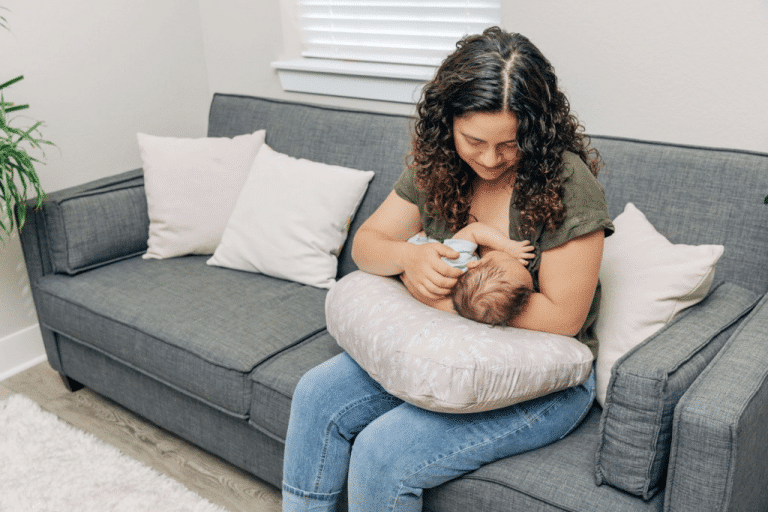Let’s talk about what happens when you have a baby who doesn’t sleep well.
I know that feeling – you’re so tired you can’t remember if you brushed your teeth this morning.
Many parents just like you have shared their stories with me about long nights with little rest.
Here’s what’s really going on: babies naturally wake up 2-3 times at night in their first year.
It’s perfectly normal! But that doesn’t make it any easier when you’re the one getting up again and again in the dark.
I want you to know you’re not doing anything wrong. Your baby is healthy and normal, and so are you.
Let me share some simple tips that have helped other tired parents get more rest.
Why Do Babies Wake Every 2 Hours?
As a sleep expert, I understand how exhausting it can be when your baby wakes every 2 hours at night. Let me explain why this happens.
Babies sleep very differently from adults. Their nighttime sleep cycles last about 2 hours, and at the end of each cycle, they enter light sleep.
This makes them more likely to wake up fully. This pattern often starts around 4 months old, when their sleep changes to become more like adult sleep.
Your baby might also wake up because they’re hungry or uncomfortable.
Some common reasons include room temperature being too hot or cold, wet diapers, or sleep timing issues during the day.
While newborns need frequent night feeds, older babies usually don’t need to eat every 2 hours at night.
Remember, these frequent wakings are normal, especially between 4-6 months.
How to Establish Better Sleep Habits
1. Making Bedtime Regular
The key to better sleep is having the same bedtime steps each night.
When I work with families, I tell them to think of bedtime like following a recipe – doing the same steps in the same order creates the best results.
Here’s what works best:
- Start your bedtime routine at the same time every night
- Keep the steps simple – a warm bath, soft cuddles, and maybe a gentle lullaby
- Make the room dark and use white noise to block outside sounds
- Set the room temperature to about 18°C (65°F)
- Use a sleeping bag for older babies or swaddle for babies under 5 months
Remember these daily tips:
- Put your baby to bed at the same time each night, even on weekends
- Watch for your baby’s sleep signs – like eye rubbing or becoming quiet
- Follow a set pattern every night, as it helps your baby know what’s coming next
- Stay calm and quiet during the routine to signal it’s time for sleep
2. Making the Bedroom Sleep-Friendly
As a sleep expert, I know that setting up your baby’s room correctly can make a big difference in their sleep. Here’s what I’ve learned works best:
Your baby’s room must be just right – not too warm or cold. Keep the temperature at about 18°C (65°F).
This helps your baby stay comfortable and sleep well through the night.
I always tell parents that light can be a big problem for a baby’s sleep.
Put dark curtains in your baby’s room to keep out any light that might wake them. This helps them sleep better, both at night and during naps.
Simple tips I recommend:
- Use white noise that stays on all night
- Keep toys and other items away from the sleeping area
- Make sure the crib has only what’s needed – a firm mattress and fitted sheet
- Check that the room is dark enough that you can barely see your hand
- Keep the air moving with a small fan if needed
These small changes in your baby’s room can lead to big improvements in their sleep.
3. Using Things That Help Sleep
As a sleep expert, I want to share the items that can help your baby sleep safely and well.
I’ll tell you what works based on your baby’s age and needs.
I recommend using a swaddle for babies under 5 months who don’t roll yet.
It helps them feel secure and stops their natural startle movements from waking them up.
Once your baby starts rolling, it’s time to switch to a sleep sack. These keep your baby at the right temperature without loose blankets.
Important safety tips I always share:
- Make sure swaddles aren’t too tight around the hips
- Choose sleep sacks that fit well – not too big or small
- If using a pacifier, check it’s clean and in good condition
- Never attach pacifiers to clothing or use cords
- Stop swaddling as soon as your baby shows signs of rolling
Remember: Simple is safe. Your baby needs just these basic items for good sleep.
4. Feeding Right Before Bed
As a baby sleep expert, let me share what I’ve learned about bedtime feeds. Getting this right can significantly affect how long your baby sleeps.
When you feed your baby close to bedtime, you help them feel full and comfortable for sleep.
But here’s what many parents don’t know – it’s best to keep your baby awake during this last feed.
They might wake up more often at night if they fall asleep while feeding.
Here’s what works well:
- Feed your baby about 20-30 minutes before sleep time
- Keep the lights slightly on during the feed
- Gently tickle their feet or rub their back if they start falling asleep
- Make sure they get a full feed, not just a snack
For nighttime feeding choices:
- Both breast milk and formula work well
- Breastfeeding moms can sit up to stay alert
- Bottle-feeding parents should hold their babies semi-upright
- Watch your baby’s cues – they’ll show when they’re full
Remember: A well-fed baby who stays awake for the feed often sleeps better at night.
5. Keeping Daytime Naps Consistent
As a sleep expert, I want to tell you how daytime naps affect your baby’s night sleep.
When naps go well during the day, nights usually go better, too.
Getting nap timing right can be tricky. I find most babies do well with naps that happen at about the same times each day.
Watch your baby, not the clock – they’ll show you when they’re ready to sleep by rubbing their eyes, getting quiet, or looking away from toys.
Key nap tips I share with parents:
- Put your baby down as soon as you see tired signs
- Keep nap spots dark and quiet, just like at night
- Don’t let naps go too long in the late afternoon
- Space naps evenly throughout the day
- Look for fussy behavior – it often means your baby is overtired
Signs your baby needs a nap:
- Slower movements
- Less interest in people or toys
- Pulling at their ears
- Becoming fussy or clingy
- Getting extra quiet
Common Mistakes to Avoid
1. Not Sticking to Bedtimes
As a baby sleep expert, I often see how changing bedtimes can affect your baby’s sleep.
Let me share what I’ve learned from helping families fix their sleep problems.
When bedtime changes each night, your baby’s body gets mixed signals.
Think of it like this: if you eat lunch at different times every day, your body doesn’t know when to feel hungry.
Sleep works the same way. Your baby’s body needs to know when it’s time to sleep.
Here’s what happens when bedtimes keep changing:
- Baby fights sleep more at bedtime
- Night wakings become more frequent
- Morning wake-up times become unpredictable
- Naps become harder to plan
- Baby becomes cranky and tired during the day
When you keep the same bedtime each night, your baby’s body learns when to feel sleepy.
This helps them fall asleep more easily and sleep better through the night.
2. Too Much Play Before Bed
As a baby sleep expert, I notice parents often play actively with their babies right before bedtime.
Let me share what I see happen when babies get too excited close to sleep time.
When babies play with energy before bed, their bodies stay alert instead of getting ready for sleep. This makes it hard for them to settle down.
These common signs are:
- Babies fight going to sleep
- They cry at bedtime
- They wake up often at night
- Their naps get shorter
- They seem tired but can’t rest
Instead, try these quiet activities:
- Read simple books together
- Sing soft songs
- Rock gently
- Look at family photos
- Have quiet cuddle time
When families choose calm activities before bed, babies fall asleep more easily. Their bodies learn that quiet time means sleep is coming soon.
3. Missing Sleep Signs
As a sleep consultant for infants, I see many families struggle to spot when their baby needs rest.
I’d like to share what I’ve learned from helping parents understand their little ones better.
When working with families, I often hear them say, “But my baby wasn’t tired!” Yet their little one shows clear hints of needing sleep.
Clear signals in babies who need rest:
- They pull their ears or touch their face
- They stop making eye contact with people
- Their eyes get heavy and blink slowly
- They stop playing with their toys
- Their mood shifts from happy to fussy
By watching for these signs, parents can help their babies get better sleep. A well-rested baby means a happier family.
Putting your baby to sleep at the right time makes bedtime easier and leads to longer, better rest.
4. Changing Routines Too Quickly
As a sleep consultant, I see parents often switch their baby’s sleep plans too fast. Let me share what happens when we need to make changes to a sleep routine.
Think about how you feel when you change your daily habits – your body takes time to get used to new patterns. Your baby feels the same way.
What works best when making sleep changes:
- Start with small 10-15 minute shifts
- Keep each change steady for 4-5 days
- Watch how your baby responds
- Write down sleep times and moods
- Make the next change only when your baby settles
When families rush changes, babies get confused, and sleep gets worse.
But with small, steady steps, I see babies adapt well. Parents who take it slow end up with better results and less stress for everyone.
Remember, helping your baby learn new sleep habits takes patience. Small steps lead to big wins in sleep training.
Tips for Soothing a Frequently Waking Baby
When babies keep waking up at night, using the right way to comfort them helps them go back to sleep.
Ways to help your baby feel calm:
- Play soft background sounds or quiet music
- Pat their back softly for a few minutes
- Make quiet “shh” sounds close to them
- Use a dim light in their room
- Keep the room not too hot or cold
Ways to help your baby learn to calm down on their own:
- Give them a minute or two before going in
- Make sure the room stays quiet and dark
- Sit by them instead of picking them up
- Keep your time with them short at night
- Do the same things each time they wake up
It takes time to find what works best. Start by giving lots of comfort, then slowly do less as your baby learns to fall asleep on their own.
Remember: what helps them today might be different next week, so be ready to change what you do while keeping to the same basic plan.
When to Talk to Your Baby’s Doctor
Sometimes, sleep problems need a doctor’s help. Look for these signs:
- Your baby is not gaining weight at the normal rate, even with regular feeding
- You notice your baby has trouble breathing while sleeping or makes strange sounds
- Your baby snores loudly most nights and seems to gasp for air
- Your baby seems very tired during the day despite long sleep periods
- Your baby gets sick often, which keeps affecting their sleep patterns
- Sleep patterns have changed a lot after any recent illness
- Your baby wakes up more than 6 times each night for several weeks
- Your baby takes more than 40 minutes to fall asleep most nights
- Your baby’s nap times keep getting shorter, or they fight sleep often
Conclusion
Getting better sleep with a baby takes time, but it does get better.
We’ve looked at simple ways to help your little one rest – from setting good bedtime habits to making their sleep space comfy.
These small changes can make a big difference.
Remember what we learned: babies’ sleep patterns change as they grow.
What works this month might need a change next month, and that’s okay. You’re learning together.
Talk to your doctor if you try these tips and still need help. They can check if there’s anything else affecting your baby’s sleep.
You’re not alone in this – many parents go through the same thing and find what works for them.
Frequently Asked Questions
Should I feed my baby before sleep?
Yes, a full tummy helps babies sleep better. But try to finish feeding 15-20 minutes before bedtime so they don’t fully depend on feeding to fall asleep.
Why is my baby suddenly waking every few hours?
Teething pain, growth spurts, illness, or changes in routine can cause more frequent night wakings in babies.










